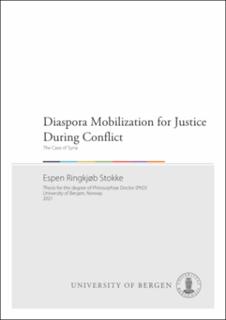| dc.description.abstract | This dissertation asks how diaspora mobilization for transitional justice evolves during conflict. Mobilization for transitional justice typically “deals with the past” and focuses on retrospective attempts to deal with injustices in post-conflict or post-authoritarian contexts. During conflict, where injustices keep occurring and transition may seem increasingly remote, conflict-generated diasporas, who are by definition linked to these injustices, are in an advantageous position to advance such claims when the space for doing so domestically is limited. It is therefore surprising that little attention has been afforded to during-conflict justice mobilization among such actors. While impunity has largely persisted in the Syrian conflict, so too has the Syrian diaspora’s devotion to advancing an agenda of justice and accountability from abroad. I draw upon qualitative interview data collected between 2014-2021 with Syrian diaspora leaders and international human rights actors to assess the trajectory of transitional justice mobilization in the context of changing conflict dynamics. I employ an analytical framework that considers motivational, strategic, and relational dimensions of diaspora mobilization, which provides ample ground to assess the evolution of agency during conflict. The dissertation is composed of three independent articles that each considers different phases of conflict.
Article I (Phase 1: 2011-2013) investigates the fragmentation among Syrian diaspora actors in the pursuit of transitional justice. More specifically, it asks why the Syrian diaspora has been unable to present a coherent and unified transitional justice agenda. By looking at strategic and relational dimensions of mobilization, the article shows how a sequence of mechanisms (transnational brokerage, vertical coordination, and patronage relations) have led to fragmentation in the pursuit of justice. New brokered links between diaspora organizations, transnational human rights organizations and donors in the West have enabled vertical coordination on transitional justice issues. In these vertical coordination structures, local expertise and documentation of human rights violations in Syria have been supplied by diaspora organizations in exchange for financial and diplomatic support by donors. Fueled by differing conceptions of justice and confidence that the regime would quickly fall, organizations proliferated in this phase of the conflict. The links between diaspora organizations and donors entrenched diaspora organizations in patron-client relations, which precluded horizontal coordination among the Syrian diaspora. Moreover, it posed challenges in terms of autonomy and the legitimacy of their transitional justice claims. While there has been concerted efforts to overcome the challenges of fragmentation in the context of increasing violence in Syria, cooperation within the Syrian diaspora remains limited on transitional justice issues.
Article II (Phase 2: 2013-2016) examines motivational and strategic rationales behind the Syrian diaspora’s continued commitment to pursuing transitional justice in the face of unfavorable circumstances. It asks why diasporas continue to pursue transitional justice when it seems highly unlikely that they will succeed. The article advances a new concept, prospective transitional justice, to accurately reflect how the Syrian diaspora pursues transitional justice claims when the space for it shrinks. Prospective transitional justice is less about how transitional justice ought to be exercised in pre- or non-transitional contexts, but rather focuses on how actors mobilize claims related to the norms, values and practices that underpin transitional justice. This includes prescriptions for transitional justice processes and the preparation of evidence in the hopes of future transitional justice in the homeland. The article identifies three distinct ways diaspora organizational leaders rationalize their mobilization for transitional justice in this context. First, they are motivated by a sense of moral obligation. Second, they argue that framing claims through transitional justice are both an appealing and effective way to pursue transformations in Syria. Third, transitional justice is a discourse through which diaspora organizations may secure institutional survival.
Article III (Phase 2016-2021) considers the expansion of universal jurisdiction cases in context of broader transitional justice claims among the Syrian diaspora. It asks why, with whom, and how the Syrian diaspora contributes to the mobilization of universal jurisdiction cases. Considering motivational, strategic, and relational elements, this article, next to the qualitative interviews that constitute the main source of data for the dissertation, also make use of an original database on universal jurisdiction cases related to the Syrian conflict. The article observes a strategic shift to pursuing justice in host countries and argues that, while the Syrian diaspora favors universal jurisdiction cases in the absence of other accountability alternatives, they perceive such cases to be a way to keep transitional justice ‘on the table’, provide some modicum of recognition to victims, and expand the scope and impact of universal jurisdiction cases beyond what it presently provides. Diaspora organizations play a key role in coalition-building with international human rights organizations, war crimes units, and supranational investigative mechanisms (such as the International, Impartial and Independent Mechanism for Syria). In addition, they provide documentation and help identifying war criminals, communicate legal access to victims, and mobilize conscience in the host state.
In sum, the dissertation contributes to a growing body of research at the nexus between diaspora mobilization and transitional justice. It provides insights on the global transitional justice industry, which may present challenges of autonomy and legitimacy of non-state actors who pursue transitional justice and the ways that it may ultimately affect mobilization trajectories. Moreover, it shows how diasporas sustain transitional justice activism in the face of adversity, motivated by strategic and emotional considerations. These findings suggest that future scholarly endeavors should evaluate motivational aspects in conjunction with strategic considerations and relational aspects. The analytical framework applied in this dissertation provides a useful way to do so. The dissertation also indicate that conflict-generated diasporas’ demands for justice may translate into the pursuit of accountability through the principle of universal jurisdiction in host countries. Diasporas are not simply bystanders who passively accept universal jurisdiction on offer, but actors who strategically take advantage of legal opportunities in multiple contexts and who use their unique advantages in terms of material and immaterial resources to build such cases in collaboration with international human rights lawyers and local prosecuting authorities. | en_US |
